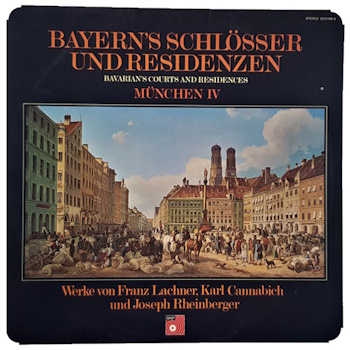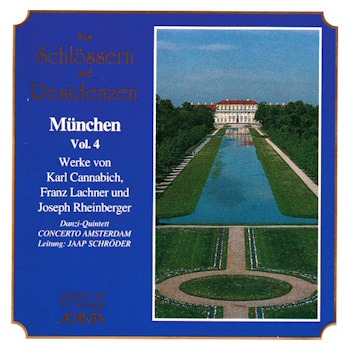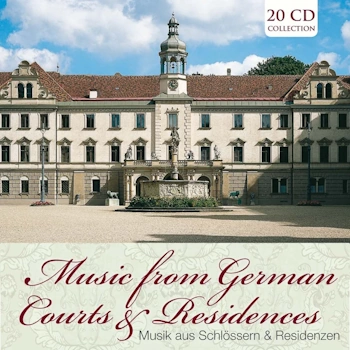 |
|
2 LPs
- 29 21166-6 - (p) 1972
|
 |
| 2 CDs -
44 2160-2 - (c) 1993 |
|
MÜNCHEN
IV
|
|
|
|
|
|
|
|
| Joseph
RHEINBERGER (1839-1901) |
Nonett
Es-Dur für Flöte, Oboe,
Klarinette, Horn, Fagott, Violine,
Viola, Violoncello und Kontrabaß,
Op. 139 |
LP 1 |
|
36' 29" |
|
|
-
Allegro
|
|
10' 39" |
|
A1 |
|
-
Menuetto: Andantino
|
|
8' 16" |
|
A2 |
|
-
Adagio molto
|
|
9' 14" |
|
B1 |
|
-
Finale: Allegro |
|
8' 13" |
|
B2 |
|
(Danzi-Quintett)
|
|
|
|
|
| Karl CANNABICH
(1769-1805) |
Divertissement
concertant F-Dur für 2 Violinen
und Orchester |
LP 2 |
|
14' 55" |
|
|
-
Adagio
|
|
2' 42" |
|
C1 |
|
-
Allegro con spirito
|
|
6' 01" |
|
C2 |
|
-
Andante sostenuto
|
|
0' 44" |
|
C3 |
|
-
Allegro |
|
0' 45" |
|
C4 |
|
-
Andante |
|
1' 12" |
|
C5 |
|
-
Allegro |
|
3' 53" |
|
C6 |
|
(Concerto
Amsterdam)
|
|
|
|
|
| Franz
LACHNER (1803-1890) |
Nonett
f-Moll für Flöte, Oboe,
Klarinette, Horn, Fagott, Violine,
Viola, Violoncello und Kontrabaß |
LP 2 |
|
36' 34" |
|
|
-
Andante · Allegro moderato
|
|
10' 55" |
|
C7 |
|
-
Menuetto: Allegro moderato
|
|
9' 03" |
|
D1 |
|
-
Adagio |
|
6' 51" |
|
D2 |
|
-
Finale: Allegro ma non troppo
|
|
9' 40" |
|
D3 |
|
(Danzi-Quintett) |
|
|
|
|
|
|
|
|
| Joseph
RHEINBERGER: Nonett Es-Dur |
Karl
CANNABICH: Divertissement |
Franz
LACHNER: Nonett f-Moll
|
|
|
|
|
|
DANZI-QUINTETT
|
CONCERTO
AMSTERDAM |
DANZI-QUINTETT
|
|
| - Frans Vester, Flöte |
- Jaap Schröder, Violine |
- Frans Vester, Flöte |
|
| - Marten Karres, Oboe |
- Jacques Holtman, Violine |
- Marten Karres, Oboe |
|
| - Piet Honingh, Klarinette |
Jaap SCHRÖDER,
Leitung |
- Piet Honingh, Klarinette |
|
| - Adriaan van
Woudenberg, Horn |
|
- Adriaan van
Woudenberg, Horn |
|
| - Brian Pollard, Fagott |
|
- Brian Pollard, Fagott
|
|
| - Jaap Schröder, Violine |
|
- Jaap Schröder, Violine |
|
| - Wiel Peeters, Viola |
|
- Joke Vermeulen, Viola |
|
| - Anner Bylsma, Violoncello
|
|
- Anner Bylsma, Violoncello
|
|
| - Anthony Woodrow, Kontrabaß |
|
- Anthony Woodrow, Kontrabaß |
|
|
|
|
|
|
|
|
|
|
|
|
|
Recorded
at: |
|
-
|
|
|
Live / Studio
|
|
Studio |
|
|
Producer |
|
-
|
|
|
Balance engineer
|
|
-
|
|
|
First LP Edition
|
|
BASF
| 29 21188-6 | 2 LPs | durata
36' 29" - 41' 30" | (p)
1972
|
|
|
First CD Edition |
|
PILZ
- ACANTA | 44 2160-2 | 2 CDs |
durata 36' 29" - 41' 30" | (c)
1993 | ADD
|
|
|
Note |
|
-
|
|
|
|
|
Musik
aus Schlössernb &
Residenzen
(20 CD Collection)

Membran |
234355 | (c) 2016
(in CD 19
& 20)
|
In
March 1800 when the
twenty-nine-year-old Karl
Cannabich took over the music at
the Munich court he had a band
of eighty-two musicians and
thirty-nine singers in his
charge. Born in Mannheim, the
son of Christian Cannabich, a
highly respected composer and
orchestral conductor, he moved
to Munich, where he became a
violinist in the court
orchestra, later going to
Frankfurt, where, from 1796 to
1799, he was a conductor at the
theatre. The short but
successful period during which
he was music director in Munich
brought to a conclusion one of
the most prolific and colourful
eras in the musical life of this
city, namely its 150 years as an
Electoral city. On May 1st,
1806, two months after Bavaria
had proclaimed a kingdom, Karl
Cannabich died at the age of
thirty-five. An obituary notice
describes him as an excellent
violinist and pianist. His own
music has nevertheless long
since been forgotten. The
charming Concertante for two
Solo Violins and Orchestra
composed around 1800, however,
can still delight music-lovers
and is a far better testimonial
to the composer’s ability than
the writings of any music
chronicler.
We can follow the progress of
the court orchestra’s public
concerts in the years following
Cannabich’s death from a report
in the „Allgemeine Musikalische
Zeitung“ dated 1832: „For nearly
half a century, in fact since
the appearance under the
patronage of Elector Karl
Theodor of the Mannheim
Orchestra, famous now in musical
history, concerts have been
given every winter by what has
been known since 1811 as the
„Musical Academy“. At first
there were 72 such concerts in
which amateurs, travelling
musicians, and young artists of
all kinds were given the
opportunity of becoming known.
Later the number was reduced to
6, then to 3. This last winter
they stopped altogether. Not
even on the Sunday before
Easter, a day when from time
immemorial there had been an
oratorio or psalm, the
„Messiah“, „The Creation“, „The
Seasons“, was there a performace
.... Where are we to seek the
causes of this remarkable lack
of public interest here? „ One
of the main reasons for the
apathy of the concert-going
public was the fact that Munich
had no musical personality to
fill the position of Musical
Director in the city. A few
years later however the
situation was to be completely
reversed when Munich gained the
services of Franz Lachner, born
1803 at Rain-on-Lech. The new
Kapellmeister had belonged to
Franz Schubert’s close circle of
friends in Vienna and brought
with him from that city, and
from Mannheim, the necessary
experience of the concert hall
and the theatre. He was a
brillant conductor, capable of
injecting new life into an
orchestra. Under him the Munich
orchestra reached a leading
position in Germany. Both the
high standard of his concert
programmes, based upon composers
of the Viennese Classical school
but taking generous account of
contemporary works, and his
well-thought out opera
repertoire had a decisive effect
on public taste in music. Two
great musical events saw the
culmination of his work – the
Munich Festivals of 1855 and
1865. In the field of
composition Franz Lachner is
known mainly for his opera
„Catarina Cornaro“ and his seven
orchestral suites. In addition
there is much in his wealth of
compositions deserving of
revival. Of particular musical
and melodic charm is his Nonet
for Strings and Wind Instruments
in F major composed in 1857 and
preserved in manuscript, it is a
companion piece to the more
frequently perfomed nonet by
Ludwig Spohr, who was twenty
years his senior. Formally, as,
for example, in the sequence of
the four movements, he strictly
adheres to the classical
tradition.
Another 19th century Munich
nonet we owe to the pen of
Joseph Rheinberger, who was born
in Liechtenstein but made his
home in Munich. Lachner aside,
he was probably the most
outstanding resident composer at
the time. At the early age of
twelve he began his studies at
the Munich Konservatorium, where
he soon attained „a degree of
skill and confidence in
counterpoint amazing for his
age“. Franz Lachner wrote in the
fifteen-year-old student’s
report: „Thoroughly trained in
theory and practice, he performs
superbly on the pianoforte and
organ, but it is his composition
which gives rise to the greatest
expectations „. At the age of
twenty he was made a professor
at the Konservatorium. Later he
worked for a short time in the
theatre and for many years was a
conductor of vocal music.
Regarded highly in the musical
world both as a person and as an
artist, he enjoyed the esteem of
many of his fellow composers and
the friendship of Johannes
Brahms. The latter observed that
he thought Rheinberger had much
in common with Franz Schubert.
As his biographer Theodor Kroyer
points out, his affinity with
Schubert lies in his
full-blooded music-making, in
his revelling in music. Just to
what extent Joseph Rheinberger’s
own ideas on the nature and
purpose of music as an art
coincide with those of Schubert
is confirmed by these words
written by him shortly before
his death, „There is no
justification for music without
melodiousness and beauty of
sound. I am well aware that
there are many opponents to my
point of view, but white is
white, not grey or black. Music
ought never to sound brooding,
for basically it is the
outpouring of joy and even in
pain knows no pessimism.“
Written 1884 when the composer
was forty-five, his nonet,
corresponding to Lachner’s in
sequence of movements, is a
testimony in sound to
Rheinberger’s conservatism in
music. It is one of the most
appealing instrumental
compositions in a plentiful
collection in which there are
still discoveries to be made.
Dr. Robert
Münster
|
|